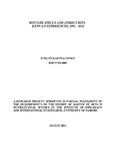| dc.description.abstract | The evolution of the perception of refugee issues from being a humanitarian issue to being
security a threat in the 21st Century, has made the government of Kenya to take the wrong course
in seeking to deal with security issues. Today, refugee discourses, policy-making processes and
scholarly fields are dominated by the language of ‘security threats’. The analysis of the
relationship between the refugee influx in Kenya and insecurity from 1991 – 2012, brings out a
different perception. The study in seeking to investigate the effects of refugee influx on security
in Kenya, the contribution of refugees to proliferation of small arms in Kenya and to critically
analyse the role of the Government of Kenya in handling refugee issues vs. security concerns,
separates refugee issues from security issues. The analysis of human security concept, translates
to respect of human rights while handling refugees issues. While World society theory locates
real power in identity groups, societal security theory on the other hand, reveals the security of
societal groups. Securitization theory plays a role where refugee issues are over securitized a
situation, which prompts reaction from the government. This study used concepts from these
theories to contribute to knowledge and understanding of the nexus of refugee issues and
insecurity. Secondary data was obtained from published scholarly materials, government reports,
journals, newsletters and newspapers and primary data from personal interviews. It is established
that criminal groups from the warring neighbouring countries are responsible for the rise of
insecurity in Kenya. They use the large refugee influxes to their advantage, to engage in illegal
activities such as trafficking illegal firearms through the porous borders to the North of Kenya,
which then, are used to commit crime in the country. Refugees, being a vulnerable group, and
most of them from Somali, a country that has had protracted conflicts for many years, are
blamed for the insecurity. In consideration of all circumstances notwithstanding, Kenya has a
mandate: to respect and improve the international refugee instruments of protection while at the
same time ensuring security for its citizens. | en |

